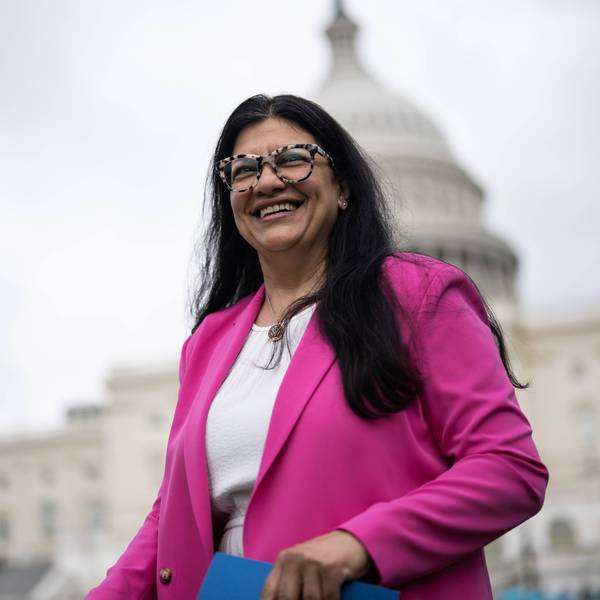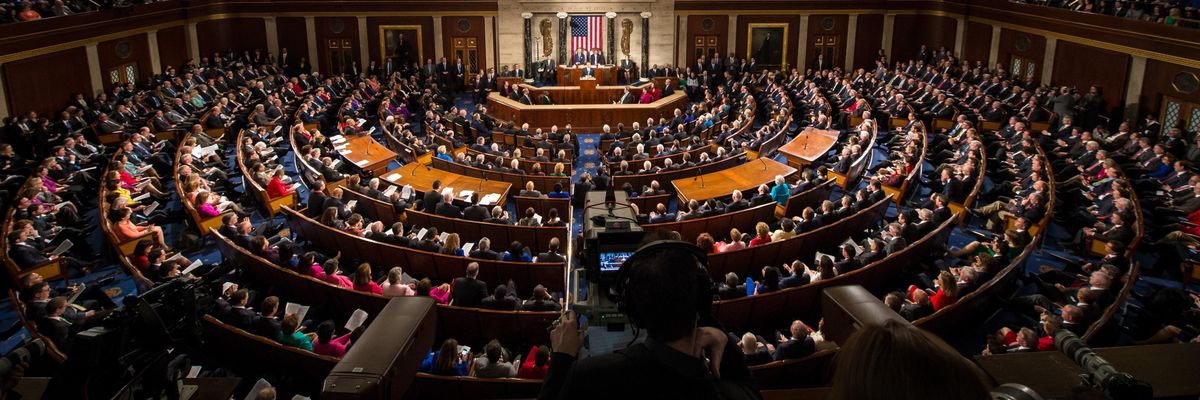At a rally in Iowa in late June, President Donald Trump responded to criticism of his millionaire-and billionaire-studded cabinet by saying that while he loves both rich and poor people, "I just don't want a poor person" running the economy.
Trump's comment was offensive. But it was also a rare instance of a politician actually mentioning the poor.
A higher percentage of Americans--14.8 percent--were living in poverty in 2014 than during the late 1960s and early 1970s. And extreme poverty, defined as living on less than $2 a day, has roughly doubled from 1996 to 2012, according to Kathryn Edin and H. Luke Shaefer's book $2.00 a Day: Living on Almost Nothing in America.
But you wouldn't know it from listening to the 2016 presidential campaign. Both Trump and Hillary Clinton's economic addresses focused much more on the middle class than on the poor, a New York Times analysis found. And transcripts of the three presidential debates show the middle class was mentioned thirteen times compared to just four mentions of poverty, the poor, or low-income people.
In ignoring the poor, Clinton and Trump have plenty of company.
During his presidency, Barack Obama spoke less about people living in poverty than any of the past ten presidents. In contrast, Obama led those ten predecessors in talking about the middle class. Obama's 2012 opponent, Mitt Romney, said he was "not concerned about the very poor" and was instead focused on "middle-income Americans."
To be fair, some presidential candidates have treated poverty as an issue worth discussing. Vermont Senator Bernie Sanders brought up topics related to income inequality and poverty so much that Clinton accused him of being "a single-issue candidate." John Edwards also made poverty a central aspect of his 2008 presidential campaign, taking his "two Americas" theme to the end of the primary season, before his campaign blew up.
Congress has also been criticized for ignoring the poor. "Missing in action," is how Representative Marcia Fudge, a Democrat from Ohio, described Congress's record on poverty.
Robert Moffitt, Krieger-Eisenhower professor of economics at Johns Hopkins University, agrees that politicians generally avoid the topic of poverty and the poor.
"Most people in Congress aren't really addressing it," he tells The Progressive. "They seem to be more concerned with the prospects of the middle class."
The poor have noticed how little they seem to matter to the politicians. "I feel like they're not talking to me," one struggling mother told CNN. Many poor people don't trust that the government has their back, and 60 percent of them believe the government should do more to help those in poverty.
Why do politicians ignore the poor?
C. Nicole Mason, executive director of the Center for Research and Policy in the Public Interest, believes politicians focus on those they think can help them the most.
"The middle class is a strong, vocal voting block, so they tend to get a lot of attention from politicians," she tells The Progressive. "The poor, not so much."
Timothy Noah, labor policy editor at Politico, tells The Progressive that the middle class is simply bigger than either the upper or lower classes, leading to a greater focus on them.
It wasn't always this way. In his 1964 State of the Union Address, President Lyndon Johnson declared a "war on poverty." During his presidency, he ushered in programs to help the poor, such as the Food Stamp Act and Medicaid.
But the very notion that government should help those less fortunate came under attack in the 1980s by a renewed rightwing intent on destroying social safety-nets. President Ronald Reagan's "pull yourself up by your bootstraps" revolution changed the political and public mindset toward poverty.
"When Reagan started talking about poverty as a cultural pathology linked mostly to black women and communities," Mason says, "the public will to really confront the root causes of poverty eroded."
But the Democrats are also to blame. In the 1990s, President Bill Clinton made Reagan's rhetoric and actions against those in poverty bipartisan by limiting the poor's access to welfare. The effect was devastating, leading to a huge spike in extreme poverty. And the Democrats have never undone the impact of that blow against the poor.
Mason says both parties tend to scapegoat those in poverty. "Some liberals and Republicans all think the same way about the poor," she says. "They blame the poor for their condition of not being able to reach the middle class."
Noah argues that this kind of rhetoric has "dehumanized" those in poverty. And he says today's politicians are still steeped in that political attitude.
"The poor are still demonized by conservatives, and I think Democrats are intimidated by the Republican rhetoric on this," Noah says. "So you don't see much discussion of poverty."
It's worth noting that under the current administration, the poor might be better off being ignored. During his campaign, while rarely explicitly naming the poor, Trump promised to help struggling people. But since taking office, he has proposed a budget that would slash programs many in poverty rely on and a health care plan that would kick many off of their insurance.
Meanwhile, Moffitt says the large number of people still in poverty has created a perception among many lawmakers and voters that poverty is an intractable issue.
However, politicians may be missing out on potential voters by not talking about poverty. About 68.5 percent of adults with an income under $30,000 a year didn't vote in 2014. That increases to 75 percent for people making under $10,000. Politifact reported the more money a person makes, the more likely they are to vote.
One reason people living in poverty don't vote in big numbers is because of an explicit strategy to lock them out: voter ID laws minimize poor people's ability to vote. However, it's also plausible that many poor people don't vote because politicians aren't speaking to their main issue--escaping poverty.
If Hillary Clinton and the Democratic Party had spoken more directly to these voters and their needs, rather than focusing almost exclusively on the middle class, they might be in control of the levers of government instead of completely out of power.
Moffitt insists it's possible for politicians to focus on both the middle class and the poor.
"There shouldn't be any conflict," he says. "The middle class has their problems and the poor have theirs, and neither one of them deserves priority over the other. It doesn't have to be a zero-sum game."




